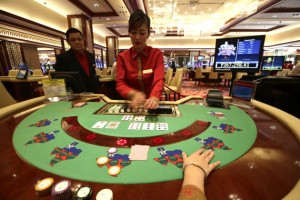Japan set to take casino gamble
TOKYO– A group of Japanese lawmakers are close to hitting the jackpot in their bid to legalise casinos, betting the revenue bonanza could challenge Macau for the title of global gaming powerhouse.
A bill is to be submitted to parliament later this year that, if passed, would pave the way for tie-ups with big name firms to build casinos across the country, said a senior Japanese lawmaker heading the push.
“Japan may be the only developed country without casinos. But we are sprinting to the finish line,” Takeshi Iwaya told AFP in an interview.
Talk about opening casinos in Japan has been on the table for years.
But a change in government and its declared aim to stoke the limp economy may give an unprecedented impetus to legalise roulette wheels and baccarat tables in the country of 128 million, analysts said.
Article continues after this advertisementShould casino legislation pass… the implications are huge,” brokerage CLSA said in a report.
Article continues after this advertisement“Japan could become one of the largest gaming jurisdictions in the world, surpassed perhaps only by Macau.”
CLSA estimated that just two gaming resorts in Tokyo and another in the smaller city of Osaka could generate revenues of $10 billion annually.
Jonathan Galaviz, managing director of US-based consultancy Galaviz & Co, said that figure could balloon if gaming resorts with hotels, retail shopping and other entertainment offerings opened across the nation.
“The potential size of Japan’s casino gaming industry could approach $100 billion over the long-term if the industry were allowed to develop and grow in an unconstrained manner,” he said.
Two casino resorts in Singapore have been an undeniable success, with a combined revenue of about $5.3 billion last year, part of a wider gaming sector boom across Asia over the past decade.
The charge has been led by the former Portuguese colony of Macau, now the world’s biggest gaming hub that generates more than six times the gambling revenue of the Las Vegas strip thanks mainly to high-rolling Chinese VIPs.
The tiny enclave’s gaming revenue jumped to a record $38 billion last year even as the pace of growth slipped from the previous year amid a slowdown in China’s economic boom.
The Philippines and Vietnam are also staking their claims to regional market share with several mega-resorts.
But Japan has long been viewed as the Holy Grail of Asian gaming due to its wealthy population, close proximity to China and appetite for other forms of legal gambling, including horse racing and betting on football matches.
Pachinko, a slot machine-style game played in thousands of smoky parlours in every corner of Japan, is estimated to generate more than $200 billion in annual revenues. Winnings can be exchanged offsite for cash, skirting gaming laws.
“Casino legislation in Japan has been discussed many times before, only to lead to disappointment,” CLSA said.
But Prime Minister Shinzo Abe’s landslide electoral victory in December has changed the outlook as he moves to get Japan’s long-stagnant economy moving with big spending, while tackling the country’s huge national debt, the worst among industrialised nations at more than twice the size of the economy.
“The election has given (Abe) a mandate to stimulate the Japanese economy through fiscal and monetary expansion, which would create a greater need for revenue for the public purse,” CLSA said.
“Casinos, as is often the case, would provide politicians with the path of least resistance to raising new funds.”
Japan is also looking to regenerate the country’s declining importance as a regional hub and boost tourism numbers which were hammered after the quake-tsunami and subsequent nuclear disaster two years ago.
But Iwaya acknowledged that casinos are not a done deal yet. Concerns about gambling addiction and the involvement of organised crime are key barriers.
“People have a sense of vigilance over these issues and are the main reasons we don’t have casinos here right now.”
